Listen to this episode now:
[powerpress]
TRANSCRIPT:
Episode no. 1141
BOB ABERNETHY, anchor: Coming up — in most states murderers can be put to death. Now the Supreme Court is considering whether those who rape children can also be executed.
Representative PETE SCHNEIDER (Former State Representative): They’re horrendous crimes. You steal their childhood, you steal their soul.
ABERNETHY: And with help from an Indiana church, this American doctor opened a small HIV clinic in Kenya 10 years ago. He now has 18 clinics treating 60,000 patients a year.
# # #
BOB ABERNETHY: Welcome. I’m Bob Abernethy. It’s good to have you with us.
# # #
BOB ABERNETHY: The two presumptive presidential candidates met with religious leaders this week. On Tuesday, Barack Obama held a closed door meeting with about 40 faith leaders, including megachurch pastor T.D. Jakes and evangelist Franklin Graham. They discussed issues from poverty and human rights to abortion and gay rights.
Meanwhile, in New York John McCain held a private meeting with Archbishop Demetrios, head of the Greek Orthodox Archdiocese of America.
According to a new political survey from the Henry Institute at Calvin College in Michigan, significant numbers of religious voters remain undecided. Despite some dissatisfaction with McCain, a majority of evangelicals did say they’ll probably end up voting for him. And for the first time in polling history, the survey found that more mainline Protestants now identify themselves as Democrats than as Republicans.
Joining me with more is RELIGION & ETHICS NEWSWEEKLY managing editor Kim Lawton. Kim, welcome. Tell us more about that Obama meeting with some big names in American religious life.
# # #
KIM LAWTON (Managing Editor, RELIGION & ETHICS NEWSWEEKLY): It was officially an off-the-record meeting but we found out some details about it. There were representatives from across the Christian spectrum there: Catholic leaders; mainline Protestant leaders. But the majority of the people there were evangelicals. And you had some people like Franklin Graham, the son of evangelist Billy Graham. You had Rich Cizik from the National Association of Evangelicals. T.D. Jakes, the big megachurch pastor and author was there. They talked very candidly with Senator Obama about a range of issues. The Senator talked about his own spiritual journey. And they asked him questions about what he believes — theological questions I’m told. Some people asked him some pretty tough questions about things like abortion, gay rights. Not everybody in the room will probably vote for Obama — probably never voted for a Democrat. But they came away being impressed, I’m told, with how he handled himself. And at the end of the meeting, they all prayed with him. Some of them actually laid hands on him in that traditional Christian practice.
ABERNETHY: And about the evangelicals — they used to be the core base of the hard Religious Right — now still heavily for McCain?
Ms. LAWTON: But not quite at the same levels as they were for George Bush in the last election. And I think that’s what’s got some people interested. There are a large number of evangelicals, about 18 percent, still undecided. And we’re hearing from some of the leaders of the movement that they’re just not that enthused about the McCain campaign and about John McCain. And so, I think the Republicans have a big challenge in trying to make sure that that base is energized because indeed they represented 40 percent of George Bush’s total vote in the last election. So they need those evangelical votes.
ABERNETHY: Kim, many thanks. There’s more on the campaigns’ faith-based outreach strategies and the Calvin College survey on the “One Nation” page of our Web site at pbs.org.
# # #
BOB ABERNETHY: At the Vatican, Pope Benedict hosted President Bush. The meeting included a stroll through the Vatican gardens. The Pope’s representatives said Benedict wanted to show Bush his gratitude for the cordial reception the Pope received at the White House in April.
# # #
BOB ABERNETHY: In Canada, Prime Minister Stephen Harper offered a strong apology to indigenous people for the government’s past abusive treatment. Harper spoke in the House of Commons to an audience that included those who had been removed from their families as children. Until the 1970s, Canada enrolled indigenous children in Christian schools that forced them to abandon their native culture and spiritual beliefs. Many of the students were also physically abused. Harper said the policies, quote, “created a void in many lives and communities, and we apologize.”
# # #
BOB ABERNETHY: The nation’s first openly gay Episcopal bishop, Gene Robinson, and his longtime partner, Mark Andrew, were officially joined in a civil union in New Hampshire last weekend. After the civil ceremony, the two held what they called a “worship service of thanksgiving.” Same-sex civil unions have been legal in New Hampshire since January.
# # #
BOB ABERNETHY: The Southern Baptist Convention has a new president: Johnny Hunt, a megachurch pastor from Georgia. Hunt was elected at the convention’s annual meeting, held this week in Indianapolis. He’s a theological conservative who wants Southern Baptists to focus more on evangelizing. The number of baptisms in the nation’s largest Protestant denomination has gone down in seven out of the last eight years.
# # #
BOB ABERNETHY: The Supreme Court ruled this week that all 270 foreign terrorism suspects at Guantanamo have the right under the U.S. Constitution to challenge their detention in federal court.
Another High Court decision excepted soon could expand the death penalty. Right now, 36 states permit capital punishment for murder. Should that penalty be extended to those who rape children? Criminologists say people are punished to prevent them from committing another crime, as a deterrent to others, to rehabilitate them and as retribution — revenge. Does revenge for child rape justify execution?
Tim O’Brien begins his report from New Orleans, and his story contains some material that may be disturbing.
VOICE OF FEMALE ANCHOR (ABC 26 News 1998 file footage): Today, safety shattered in a quiet neighborhood. A child raped. The teens who did it — on the run.
VOICE OF MALE ANCHOR (ABC 26 News 1998 file footage): An eight-year-old Girl Scout raped in her Harvey neighborhood is recovering from surgery tonight.
VOICE OF MALE REPORTER (ABC 26 News 1998 file footage): People who live in the Woodmere subdivision are hoping for peace of mind. The thought a rapist is on the loose . . .
TIM O’BRIEN: The brutal rape of a small child galvanized this normally tranquil community just outside New Orleans and horrified the neighbors.
UNIDENTIFIED MAN #1: There’s got to be some maniac running around out here.
UNIDENTIFIED WOMAN: I wouldn’t have never thought that someone would live on my street and do something like this.
Sheriff HARRY LEE (Jefferson Parish, LA, during 1998 press conference): I’m in my 18th year as Sheriff and I’ve seen a lot of bad things happen, and this is probably the worst.
O’BRIEN: So bad, that Jefferson Parish Sheriff Harry Lee put up $5,000 of his own money for information leading to an arrest.
In addition to the psychological trauma, the eight-year old girl also suffered severe physical injuries. The city of New Orleans rallied to help including the New Orleans Saints football team, which launched a fundraising drive to help defray the child’s mounting medical expenses.
KAREN TOWNSEND (Reporter, ABC News 26, from 1998 file footage): Sheriff Lee says the prime suspects in this case are two black teens.
O’BRIEN: The manhunt became so intense, Sheriff’s deputies began stopping all young black males in the neighborhood.
UNIDENTIFIED MAN #2: They made me take my shirt off. And, you know, it’s cold out here, you know?
VOICE OF FEMALE REPORTER: What were they looking for?
UNIDENTIFIED MAN #2: Just tattoos, any little marks.
O’BRIEN: The victim had told police her attackers were two black teenagers. But the story fell apart and suspicion began to shift to the child’s stepfather Patrick Kennedy who had called co-workers on the morning of the rape seeking advice on how to remove blood from a white carpet.
It turned out, Kennedy also had been accused, although never convicted, of sexually molesting four foster children in his care. They were removed. His eight-year-old stepdaughter eventually said that it was Kennedy — six-feet-four, 375 pounds — who had raped her and then told her to blame it on the teenagers.
CHILD VICTIM: First, he told me that he was going to make up a story and I better say it.
O’BRIEN: And, she said, it wasn’t the first time Kennedy had sexually molested her.
FEMALE INTERVIEWER: Did Patrick Kennedy do something to you just that one day or did he did he do anything any other times?
CHILD VICTIM: He did more than once. I think five (holds up five fingers).
PROSECUTOR: More than once? You think five?
CHILD VICTIM: “Um-hmmm.”
PROSECUTOR: Okay. Do you remember how old you were the very first time he did something?
CHILD VICTIM; (shakes her head “no”)
O’BRIEN: Three years earlier the Louisiana legislature overwhelmingly passed a law authorizing the death penalty for anyone who rapes a child under the age of 12. The jury agreed unanimously: Patrick Kennedy deserved nothing less. The law was introduced by then state Representative, Pete Schneider
(to Rep. Pete Schneider): Is this the kind of guy you had in mind when you passed this law?
Representative PETE SCHNEIDER (Former Louisiana State Representative): Absolutely. Someone who would brutally rape a child — and rape is wrong no matter whom it is done to, but in a situation like this, I believe the death penalty is the appropriate punishment for the crime.
O’BRIEN: Kennedy’s court appointed lawyers disagree, and have taken their case to the U.S. Supreme Court arguing if the death penalty for rape isn’t cruel, it certainly is unusual — violating the Eighth Amendment to the U.S. Constitution.
BILLY SOTHERN (Capital Appeals Project): Mr. Kennedy is one of only two men on death row in the state of Louisiana for the crime of child rape. Indeed, Mr. Kennedy and this other individual are the only two men in the United States for the crime of child rape who’ve been sentenced to death.
O’BRIEN: The U.S. Supreme Court, more than 30-years ago, found the death penalty unconstitutional for rape — that death is disproportionate to the crime.
BARBARA WALTERS (Anchor, ABC Evening News, from 1977 file footage): Good Evening. Our top stories: The Supreme Court says the crime of rape should not be punishable by death.
O’BRIEN: But that case involved a 16-year old married woman. Louisiana contends the rape of a child is much worse and that the Court’s earlier opinion shouldn’t apply when the victim is so young.
Rep. SCHNEIDER: Twenty-nine percent of the rape cases in this country — and it’s probably underreported — are committed on 11-year-olds and younger. Twenty-nine percent!!! And they’re horrendous crimes. You steal their childhood, you steal their soul. You hurt the world when you do something like that to a child.
O’BRIEN: We may never know to what extent, if any, the death penalty actually deters but there’s clearly another theory behind this Louisiana law. Call it revenge, or retribution, or a thirst for simple justice, which, if left unfulfilled, may encourage others — loved ones — to go out and find it on their own.
Sex offenders may be the least likely to be deterred and their crimes are the most likely to bring retribution.
Jeffrey Doucet suspected of kidnapping and molesting an 11-year old Baton Rouge boy. When sheriff’s deputies brought Doucet back to Louisiana, the boy’s father — Gary Plauche — was waiting at the Baton Rouge airport with a gun.
Believing they could never get a conviction, prosecutors allowed Plauche to plead guilty to manslaughter with a suspended sentence.
The State’s Attorney General Buddy Caldwell says it’s the state that must exact the retribution — not loved ones — and that the Louisiana law makes it less likely they”ll try.
(to LA Attorney General Buddy Caldwell): Even if it doesn’t deter others — that’s an open debate — but even if it doesn’t, you say the death penalty in cases like this is justified?
BUDDY CALDWELL (State Attorney General, LA): I believe it absolutely is.
O’BRIEN: Retribution alone is enough?
Mr. CALDWELL: Retribution alone is enough.
O’BRIEN: Some of your opposition, including the Catholic Church, will quote the Bible and say, “Vengeance is mine so sayeth the Lord.”
Mr. CALDWELL: Well, we see a lot of people that don’t have a clue. But I think most people understand, even liberals have children that if they’re raped and mutilated like in a lot of these cases, they would be for the death penalty, whether they say so or not. It’s always the other guy.
O’BRIEN: It’s a retributive function of the law?
Mr. CALDWELL: I think so.
O’BRIEN: Ironically, a number of child advocacy groups are siding with the defendant in this case, telling the Supreme Court the death penalty for child molesters is counter-productive.
Judy Benitez, who heads the Louisiana Foundation Against Sexual Assault, says Louisiana’s law may discourage children from coming forward and give the molester an incentive to kill his victim.
JUDY BENITEZ (Executive Director, Louisiana Foundation Against Sexual Assault): If they’re not facing any harsher punishment for killing the child and raping them then they are for — and I say this sort of facetiously — for just raping them, you know the state can’t kill them but once, So what are they going to do? And this way they don’t leave a living witness.
O’BRIEN: Patrick Kennedy’s lawyer says if retribution is the goal, life in prison is retribution enough.
Mr. SOTHERN: The alternative punishment here in Louisiana for the crime of child rape is life without the possibility of parole at Angola penitentiary. It’s “you die at Angola.” So it’s not like the alternative punishment for this is somehow lenient. The alternative punishment in this instance is extraordinarily harsh.
O’BRIEN: Both sides agree the law does make it easier for prosecutors to negotiate a plea agreement with the defendant for life in prison, sparing the child the trauma of having to testify at a trial.
The question for the Supreme Court, however, is not whether this is a wise law or even a good law or whether it even makes any sense at all, only whether it’s such a bad law as to violate the standards of decency of a civilized nation as embodied in the U.S. Bill of Rights.
For RELIGION & ETHICS NEWSWEEKLY, I’m Tim O’Brien in Washington.
# # #
BOB ABERNETHY: At the start of this year, in Kenya, in East Africa, terrible, largely tribal violence took more than a thousand lives and drove hundreds of thousands from their homes. But there were a few compounds of safety, among them the clinics run by an American doctor. There, Kenyans of different tribes found common ground in their Christian faith. Such sanctuary was one of the many outgrowths of a ministry that began with one small anti-AIDS clinic and now serves 60,000 patients with the back-home support of a church in Indiana. Fred de Sam Lazaro has the story.
FRED DE SAM LAZARO: From its location on the edge of the city, the North United Methodist Church in Indianapolis boasts a number of global ties.
Reverend KEVIN ARMSTRONG (Pastor, North United Methodist Church, Indianapolis, speaking to Joseph Okuya from Kenya): Joseph, please come here and join me as we welcome you.
DE SAM LAZARO: None are closer than those to Kenya.
Rev. ARMSTRONG (speaking to Mr. Okuya): As you know we’ve been praying with and for you, for the people of Kenya. It helps us to know a little bit from you, how are things now?
DE SAM LAZARO: The honored guest told of the deadly post-election violence in his country.
JOSEPH OKUYA: Of course, we see that at the peak the leaders have made some kind of an agreement. But down in the grassroots, it’s still smoldering.
DE SAM LAZARO: The Kenya connection traces back almost two decades to one couple from this congregation. In recent months, Joseph and Sara Ellen Mamlin have brought them news from the frontlines of a distant conflict.
Dr. Joseph Mamlin first visited here in the late �80s to set up an exchange program between his employer, Indiana University School of Medicine and a med school in the western Kenyan city of Eldoret. He returned a decade later to a worsening AIDS problem here and decided stay on and set up a small HIV clinic — or so he thought.
Dr. JOSEPH MAMLIN: It grew to where I had 1,500 patients out of this one room and just lying all around on the ground. We had the largest village-based HIV clinic in Kenya. And we were just working out of this one room. And then I was home visiting my children and grandchildren years ago and someone called my wife and asked to meet her at JC Penney at a shopping mall. And she just anonymously handed her a check and said, “Joe needs a clinic.” And this is what you see here. This is all from an anonymous donor in Indianapolis from the church.
We had the National Minister of Health, and the U.S. Ambassador dedicating, but, that’s not the real dedication. Here I see a beautiful lady coming by here. This is Rose Beargen. She’s one of the very first patients I treated here, many years ago. And I’m the one looking sick now instead of her. And — but she was essentially dying of PCP pneumonia. She was almost a dead woman.
DE SAM LAZARO: Today she runs the clinic’s outreach program. The miracle of her recovery began in this pharmacy. It’s well-stocked with antiretroviral drugs for HIV, thanks to a major grant from the U.S government’s “President’s Emergency Program for AIDS Relief” or PEPFAR.
Dr. MAMLIN: Look what we have here. This is PEPFAR in action. People who’ve been in this business and watching people die in Kenya will walk in a room like this, they will cry. To see this umbilical cord to life, made available by the American people free of charge for all of these patients, is a miracle. And it’s just simply wonderful.
DE SAM LAZARO: Today, some 60,000 patients receive care in 18 regional centers. Mamlin notes only two American doctors work alongside several hundred Kenyan colleagues and staff — a staff so dedicated he says, that many were on the frontlines of emergency care during the turmoil. None of the acrimony from the ethnic violence that followed December’s elections spilled into the compounds of their clinics.
HENRY MUITIRIRI: I think in the organization we didn’t have any inciter who could come and incite us to fight. We work as one.
DE SAM LAZARO: Many employees took shelter in the project’s compound. Even though they were from tribes fighting each other on the outside, they drew on faith to stay together inside.
PANINAH MUSULA: We had a Christian group. We had prayers. We had to sing together. We had to pray together. That united us that we could not rise against one another.
SAMMY KIMANI: We need to believe that we can have peace back and we need it. We had hope.
DE SAM LAZARO: But all around them the devastation did not spare even churches — the toll not just in death and property damage but also interruption in the careful drug regimens for AIDS patients.
Dr. MAMLIN (talking with patient): You missed two days.
UNIDENTIFIED PATIENT: There was no means to come here.
Dr. MAMLIN: I want you to know that missing your medicine even two days is dangerous. I know you could do nothing. It’s not your fault.
DE SAM LAZARO: The most immediate challenge was in tracking down the thousands of patients who fled the violence, making sure they were supplied with their drugs. Many scattered into makeshift camps for displaced people, some of which still remain.
Thirty-seven-year-old Purity Wambui took shelter in this church. She got a coveted indoor spot since she has a newborn. That makes life easier, but hardly easy.
PURITY WAMBUI: The health becomes deteriorated because you have nothing to eat. Before we used to have balanced diet but now it’s hard to get that balanced diet. We just rely on maize and yellow peas; milk�milk is a dream.
DE SAM LAZARO: Nonetheless she’s grateful — not just for drugs that have kept her alive �but for provisions the Indiana partnership distributes to her entire family. It’s the middle step in restoring patients, says Mamlin.
Dr. MAMLIN: When I first pick up a patient who’s wasted, they look up at me and you can tell even if they say nothing, they just want the drugs so they can live. And about six or eight weeks when they see that they’re living they kind of look back at you and say, “I’m hungry!” And then, let another two or three months go by as they are walking around and looking normal, they wonder, “How do I get back on my feet and become a whole person again?”
DE SAM LAZARO: That takes clinics into matters far beyond the immediate medical needs. Each day there are tough calls to make on how to disburse limited funds.
Dr. MAMLIN (speaking to patient): You have no school fees?
DE SAM LAZARO: Mamlin turned down this mother’s request for school fees.
Dr. MAMLIN (reading request from patient): “To whom it may concern.” That’s usually my middle name. No, you have to see Diana, the social worker. There are so many of these it’s impossible for me to do all of them
DE SAM LAZARO: The next patient, a tailor named Clement, was luckier.
CLEMENT (speaking to Dr. Mamlin): When I went out to vote but when I came back they looted my house.
DE SAM LAZARO: Luckier that is, for someone who’d lost all his belongings, including his sewing machine.
Dr. MAMLIN (to Clement): I have some friends in U.S. And they’ve donated a little bit money for me to use. So I’m going to qualify you for that. And I’ll get you a machine and I’ll get you materials to get back in business.
CLEMENT: I thank you very much, sir.
Dr. MAMLIN: Do you want to reconstitute immune systems or do you want to reconstitute lives? And those are two totally different problems. And we’ve decided to go after lives. We’re taking care of the poorest of the poor.
DE SAM LAZARO: It’s a choice that may be rooted in faith, but faith is a matter Mamlin does not share publicly.
Dr. MAMLIN: I have much more concern about what needs to be done as an expression of whatever faith system we have. I guess I’m raised in tradition that tends to avoid putting things like that on your shoulder.
Rev. ARMSTRONG: There’s a wise old church leader who said, “Preach the Gospel and, if necessary, use words.”
DE SAM LAZARO: Back in Indianapolis, pastor Armstrong says what began as a public health program has also spawned numerous exchanges between worship communities here and in Kenya. For the Hoosiers, he says it’s widened their understanding of a distant land and a complex epidemic and it’s helped them spiritually.
Rev. ARMSTRONG: Who are the people you want your children to learn the Christian faith from? The Mamlins would be at the top of that list. And so for us to be able to find some way to be alongside them in their journey not only was a way for us to strengthen our friendship but also for us to deepen our own faith.
DE SAM LAZARO: For RELIGION & ETHICS NEWSWEEKLY, this is Fred de Sam Lazaro.
# # #
BOB ABERNETHY: : In Jordan, archaeologists say they may have found the world’s oldest Christian church. The researchers were digging under an ancient church where they found a cave with evidence of even earlier Christian worship, possibly from the first century. Worshippers may have used the cave to hide from persecution. Christian leaders in Jordan hailed the discovery, but historians said further study is needed.
# # #
BOB ABERNETHY: Finally, Golf Digest is issuing an apology after offending the American Sikh community with an article featuring a golf guru. The article used the image of a South Asian man holding a golf club and wearing a golf glove. Alert readers noticed the man looked suspiciously like Sikhism’s fifth prophet, Guru Arjan Dev Ji. Sikhs protested, calling the image a desecration. Manjit Singh of the Sikh American Legal Defense and Education Fund says they’re pleased with Golf Digest’s quick response — especially, he says, because golfing is huge in the Sikh community.
# # #
BOB ABERNETHY: That’s our program for now. I’m Bob Abernethy. There’s much more on our Web site, including an exclusive interview that Fred de Sam Lazaro did while he was in Kenya with a Quaker minister who described religion’s role in that nation’s recent turmoil. Join us at pbs.org.
As we leave you, scenes from a ceremony in China to remember the victims of last month’s earthquake. Thousands of Chinese wrote messages to the victims on waterproof shells, and, with candles in each one, set them afloat.
© 2008 WNET-TV. ALL RIGHTS RESERVED.
Prepared by Burrelle’s Information Services, which takes sole responsibility for accuracy of transcription. No license is granted to the user of this material other than for research. User may not reproduce any copy of the material except for user’s personal or internal use and, in such case, only one copy may be reproduced, nor shall user use any material for commercial purposes or in any manner that may infringe upon WNET-TV’s copyright or proprietary interests in the material.









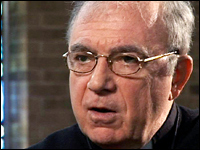

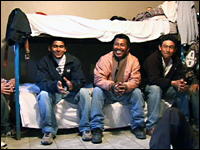
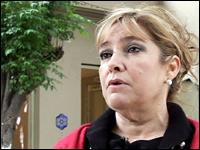
 DE SAM LAZARO: They have more energy?
DE SAM LAZARO: They have more energy?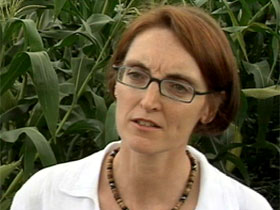 CECILY BRYANT (Country Director, CARE, Malawi): We felt very strongly that the inefficiency and the waste that was happening throughout the current system just had to be addressed, and if we didn’t take a stand and try and make a change then this would just continue.
CECILY BRYANT (Country Director, CARE, Malawi): We felt very strongly that the inefficiency and the waste that was happening throughout the current system just had to be addressed, and if we didn’t take a stand and try and make a change then this would just continue.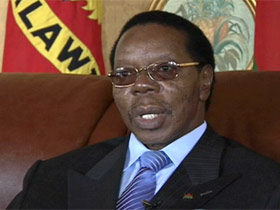 President BINGU WA MUTHARIKA: We now have had the success — two successive years of surplus. When I took over, we were told Malawi was poor and that we must go to the rest of the world and beg that we are poor, and the world will feel sorry for us. I said no, that’s not the way the world in globalization works. People will come to Malawi to invest in opportunities if we are helping ourselves and they want to be part of that success story. Nobody, nobody wants to be part of a failing story.
President BINGU WA MUTHARIKA: We now have had the success — two successive years of surplus. When I took over, we were told Malawi was poor and that we must go to the rest of the world and beg that we are poor, and the world will feel sorry for us. I said no, that’s not the way the world in globalization works. People will come to Malawi to invest in opportunities if we are helping ourselves and they want to be part of that success story. Nobody, nobody wants to be part of a failing story.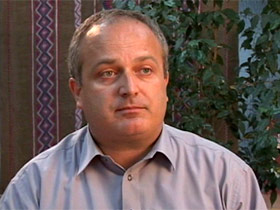 DOMENICO SCALPELLI (World Food Program): That’s a huge amount of food, and it’s the biggest amount — the largest amount we’ve bought ever from Malawi. A lot of it was not only for Malawi, but a lot of it also went to Zimbabwe, it went to Democratic Republic of Congo. We bought food even for West Africa, so — and that was because the price was the best at the time and the quality was good, competed internationally. Part of the philosophy behind it is to try and bring up local farmers and traders to a point where they can, in fact, compete internationally.
DOMENICO SCALPELLI (World Food Program): That’s a huge amount of food, and it’s the biggest amount — the largest amount we’ve bought ever from Malawi. A lot of it was not only for Malawi, but a lot of it also went to Zimbabwe, it went to Democratic Republic of Congo. We bought food even for West Africa, so — and that was because the price was the best at the time and the quality was good, competed internationally. Part of the philosophy behind it is to try and bring up local farmers and traders to a point where they can, in fact, compete internationally.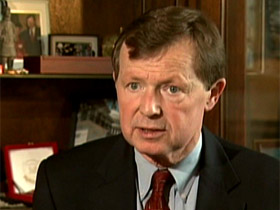 DE SAM LAZARO: More importantly, Pomeroy says he fears any changes could jeopardize fragile congressional support for what remains the world’s largest food aid program, even though it accounts for just $1.2 billion of the $280 billion U.S. farm program.
DE SAM LAZARO: More importantly, Pomeroy says he fears any changes could jeopardize fragile congressional support for what remains the world’s largest food aid program, even though it accounts for just $1.2 billion of the $280 billion U.S. farm program.